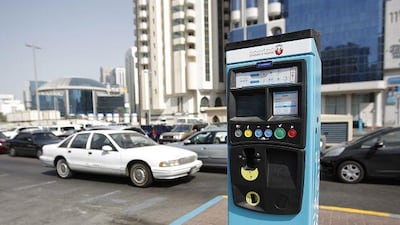The capital's paid-parking programme was to be extended today in a move aimed at tackling the chronic shortage of spaces. The Department of Transport this morning was to roll out an additional 2,159 spaces - of which 723 are underground - as part of the Mawaqif initiative.
Areas covered by the extension to the project include Corniche Road, East Road and Khalifa Street, the department said. Parking meters will be placed throughout the areas and colour-coded kerbstones will determine the price of parking. Premium parking, painted in turquoise and white, is Dh3 per hour, allowing a maximum of four hours of parking. Standard parking, painted in turquoise and black, is Dh2 per hour or Dh15 for an all-day ticket. There is no limit to the time spent in standard parking spaces. Overnight parking from 9pm until 8am in these spaces will be free.
Najib Al Zarooni, the general manager of parking at the Department of Transport, said: "Mawaqif was created to serve the community and its role is not limited to the implementation of paid-parking services [but] with the aim of providing comprehensive and sustainable solutions to address the growing needs for parking." For Ned Greene, who lives in one of the existing paid-parking areas, the introduction of Mawaqif has improved traffic flow.
"We have [parking spaces] in our building but it has been great because it has cleaned up the block and looks much nicer. No cars are parked everywhere or in the middle of the road," Mr Greene said. Lubna Rostom, who lives in Khalifa Street, said the paid-parking system had failed to solve the real problem. "I would be willing to pay Dh5,000 if it ensures me a parking spot," said Ms Rostom, whose complex was the first area unveiled by Mawaqif for paid parking.
"I am not saying a designated parking spot, but there is no space to park. Before there was no parking. Now you pay and there is still no parking," Ms Rostom said. Residents have complained that parking spaces are in short supply considering the high number of cars in the area. "If they had done a survey, they would know how many residents there are. The spaces are not enough for the residents let alone the employees," Ms Rostom said.
Previously, the department said it planned to activate the meters in one or two areas of the city each month this year. By the end of the year, there will be 29,776 paid parking spaces in 19 zones. The department was also planning to add 2,000 parking spaces in the city, officials said, including two automated car parks in the Tourist Club Area and Salam Street, and two temporary steel structures near the Corniche, Salam Street and Zayed the First Street.
For residents in these areas, it costs Dh800 for a first permit and Dh1,200 for a second. To apply, residents must take a copy of their passport containing their residency visa, a lease or proof of ownership of a residence, their most recent electricity bill and proof of vehicle ownership. If a wife or husband wants to obtain a permit but their spouse's name is on the tenancy contract, they must also bring proof of their relationship to the owner of the vehicle.
As for employees who work in these areas, but reside outside, they are required to pay the daily charges. Government officials say the move to paid parking is vital for Abu Dhabi, where congestion has cost the economy Dh5 billion a year, according to a report issued in 2008 by the Department of Planning and Economy. The number of registered vehicles has surged in recent years, including an increase of 16 per cent between 2005 and 2008.
The entire paid-parking programme should be in place in about two and a half years, officials said. Parking spaces will also likely be freed up through a government initiative announced this month to move all businesses relating to vehicles outside the central business district - defined by the areas between the Corniche and Al Falah Street (9th Street), and between Meena Street and King Khalid bin Abdul Aziz Street (26th Street) ? by next year. Abu Dhabi Municipality said the move was, in part, to ease congestion. @Email:myoussef@thenational.ae * With additional reporting by Matthew Chung

